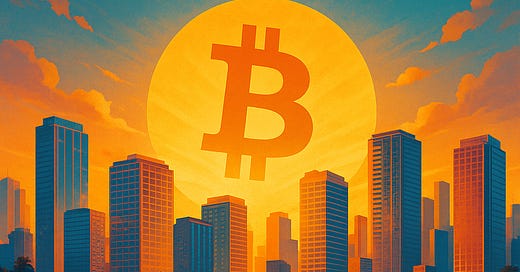The Day Bitcoin Ate Real Estate
How the First Pure Bitcoin Real Estate Transaction Signals the Future of Property
On April 26, 2025, a quiet but historic milestone occurred in Miami, one that may soon be recognized as a turning point in economic history.
At The Rider Residences, developed by Rilea Group and Cipres, the first direct wallet-to-wallet Bitcoin real estate transaction was completed with no banks, no fiat rails, and no conversion to dollars.
A fully furnished east-facing studio with 391 square feet of interior space and a 133 square foot private terrace sold for $528,900, around $1,353 per square foot. Yet, the true transaction was not measured in dollars. It was settled directly, immutably, wallet to wallet in Bitcoin.
Facilitated by Cervera Real Estate’s Jake Lecce, Uri Redler, and Yessika Arevalo, the transaction bypassed the traditional financial system entirely. No escrow agents, no delayed wire transfers, and no government-backed currencies. Final settlement occurred instantly between the two wallets, proving that full-stack Bitcoin real estate transactions are no longer theoretical, they are now reality.
This is more than a mere curiosity. It is a signal marking a profound shift. Bitcoin is no longer merely an investment, it has become critical financial infrastructure.
Until now, real estate carried a heavy burden. It served as both shelter and store of value. Families and investors poured money into property not just for living or utility, but as a hedge against currency debasement. The monetary premium, or the extra cost embedded in property values simply because people needed an inflation-resistant asset, pushed real estate prices well beyond their intrinsic economic value.
Bitcoin changes that. Bitcoin is monetary premium digitized, portable, and secure. It provides a pure store of value without the burdens of maintenance, taxation, physical risk, or political jurisdiction.
What happened in Miami is not just a novelty. It is the beginning of real estate being unbundled. For the first time, the settlement layer and the value storage function have been separated from the asset itself. Real estate can now return to its truest form, shelter, location, and utility, rather than serving as a monetary vault.
And Bitcoin continues absorbing more pieces of the old world, one transaction at a time.
Miami was the natural birthplace of this breakthrough, having strategically positioned itself at the intersection of real estate, technology, and financial innovation for years. Bitcoin conferences, crypto-friendly mayors, and an international clientele accustomed to cross-border transactions created the ideal conditions for the first pure wallet-to-wallet real estate sale.
Yet, this innovation won’t remain confined to Miami. Now that a fully settled and legally recognized Bitcoin transaction for titled real estate exists as a blueprint, developers, brokers, and buyers worldwide will undoubtedly take notice. The next sales will be faster. Paperwork will simplify. Smart contracts may integrate directly with title deeds. Real estate deals that once took weeks could close in mere minutes.
This single event unlocks a powerful future where Bitcoin native transactions become standard instead of exotic. The implications are enormous: no currency conversion risks, no bank wires delayed by compliance reviews, and no intermediaries extracting fees merely to transfer money. Bitcoin takes on the roles of escrow agent, wire transfer, and closing table, all seamlessly combined into one action.
As developers recognize these efficiencies, we may soon see entire projects denominated in Bitcoin, from pre-sales and deposits to closings, with title companies either adapting or replaced entirely by on-chain verification layers. What once seemed unimaginable will soon become commonplace.
Viewed from the long arc of history, this moment will appear inevitable. When a technology emerges that is faster, cheaper, safer, and borderless, it inevitably absorbs the outdated systems built on slowness, expense, fragility, and gatekeeping.
Bitcoin is doing to real estate what it already accomplished in payments, and what it will inevitably do to finance, government bonds, and any other asset whose value relied on inefficiencies inherent in the previous system. The first wallet-to-wallet real estate sale has occurred. The second, third, and thousandth are inevitable. The gates have opened, and Bitcoin, true native Bitcoin, is walking through.
The old financial rails won’t vanish overnight, but make no mistake, the great migration has already begun.
The world won’t notice at first. But someday they’ll look back and realize Bitcoin didn’t just buy a condo in Miami. It bought the future.



